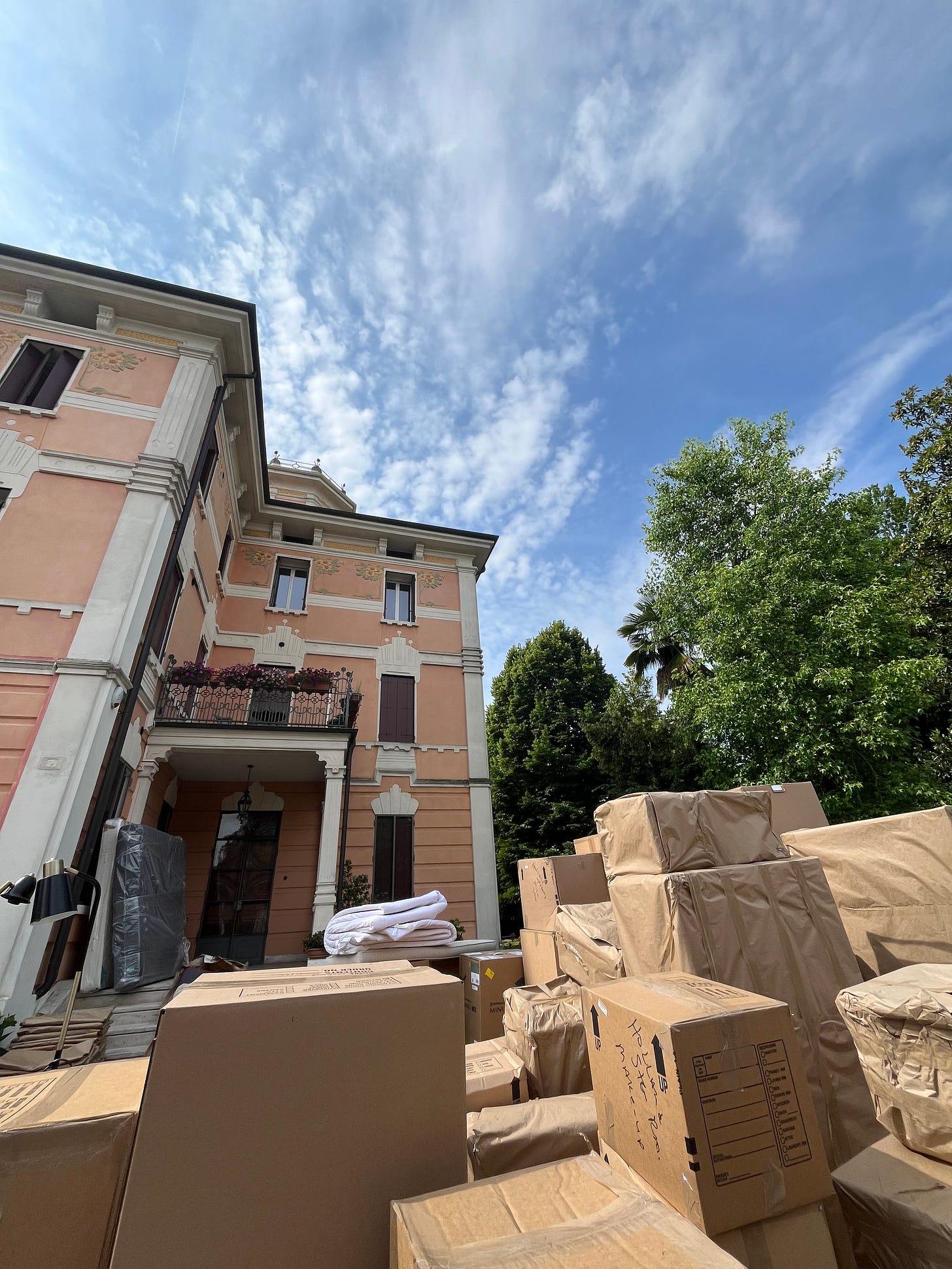Should you move abroad? What to consider before taking the leap
And why you shouldn’t try to travel like a local
Gooood afternoon -
This is going to be a ramble. If you’re here for the ‘what to consider before moving abroad’ portion, go ahead and scroll to the end. Everyone else, here are some jumbled thoughts I’ve had lately about leaving the U.S.
Should you move abroad?
Around 9 million Americans––excluding those in the military—currently live abroad. That number could increase over the next few years.
A recent Harris-Fast Company poll found that 42 percent of Americans have considered or plan to move abroad to improve their happiness, and nearly a fifth of young people are seriously considering a move. Americans say they will have a better quality of life abroad and cite cost of living and politics as their main motivation to leave.
The results show that Americans are becoming increasingly disillusioned with the ‘American Dream’ as the cost of essentials like rent, healthcare, and education continues to rise. The current economic reality is even more disheartening for families: According to a recent National Women’s Law Center analysis, the average family would need to earn at least $180,000 annually in 2025 to afford the national cost of infant care comfortably.
U.S. applications for Irish passports are at their highest level in a decade. Average monthly applications in January and February of nearly 4,300 were up around 60% from last year, according to data from Ireland's Department of Foreign Affairs. Relocation companies and websites helping people emigrate told Reuters that, at any given time in recent years, a significant number of Americans have shown an interest in moving abroad, citing issues including political divisions and gun violence.
But most of the relocation firms that Reuters spoke to said there has been a larger spike in interest since Trump returned to the White House, with many clients expressing concern over the direction of policy and social issues.
High-quality life still annoyingly includes admin
I get it. I live abroad, and my quality of life is higher than it would be for the same price in Baton Rouge or Chicago, the two U.S. cities I’ve lived in most recently. The things I like the most (food, wine, travel) are significantly cheaper here. I can get very good bottles of wine for eight euros (pretty good for even less). The average bowl of pasta is around 10 euros. Train travel is easy and budget airline flights are routinely less than 30 euros.
Other things, like gas and taxes, are much higher in Europe. The trade off is functioning social services.
But there are things I do miss about the U.S. Diversity, in people, food, and perspectives. This is more of a big city thing than a U.S. thing, but I miss innovative local businesses doing cool things (Italy has tons of local businesses, but in my town they’re more traditional than innovative), nightlife, better food delivery, theater, coffee shops that you can sit and work in, spicy food, fully understanding every conversation, the general convenience of life in U.S. cities.
I would miss a lot of these things if I lived in a small town in the U.S., too, but the point is that I think a lot of people have an idea of life abroad. They think they’ll move to some tiny town, or a house in the countryside, and everything will be idyllic and wonderful.
While much of life abroad is eye opening and enriching and wonderful, it can also be hard. Learning a new language—like really learning it well enough to go to the doctor (and have a baby!) or register your car––is much different and harder than learning it well enough to order food and get a taxi. Figuring out how another country’s admin works can be exceedingly frustrating (the U.S. did not invent bureaucracy). Simple things you thought were a pain but relatively easy, like the post office, or taking out the trash, are suddenly confusing.
You’re not on vacation. You’re working. You’re going to the grocery store. You’re scheduling dentist appointments. It’s just normal life.
Please don’t misunderstand me. I love living in Italy and have mostly loved living in all of the countries I’ve been lucky enough to call home over the past 12 years. But each has its own challenges and oddities.
I can only imagine how difficult it must be to try to navigate being an immigrant in the U.S. At least everywhere I’ve lived, most people know some English and are generally happy to have Americans working there. Doing this in a hostile environment where few people can or are willing to speak your language would feel impossible.
Europe is far from perfect
Previously, I would always remind myself that as bad as things could be in the U.S., at least we still had democracy, free speech, and a free press. I was soo irritated with other expats in Dubai who ignored the many human rights abuses there while raging about the U.S. The UAE was/is so much worse! Increasingly, that is not the case. Increasingly, Americans have no moral high ground. Increasingly, things like democracy and free speech are under threat (understatement). Civicus, a global civil rights watchdog, recently added the U.S. to its watchlist of countries currently “experiencing a rapid decline in civic freedoms.” Democratic Republic of the Congo and Pakistan are on that list.
So is Italy. Which brings me to my next point. American friends I speak with often think all of Europe is so much better than the U.S. And so much of it is. On many things— health care, affordable childcare, climate change, tech regulation–Europe is far ahead.
What I hear from people considering a move is that Europe is so progressive that once they move, and they won’t have to think about any of the issues that plague the U.S. But many countries in Europe are also racist, homophobic, anti-immigration, and insular. Italy definitely included.
Europe isn’t perfect. Authoritarian governments are on the rise all across Europe, too.
‘Travel like a local’ is bad advice
Choosing to live abroad—and for most of the people having this conversation it is very much a choice––is a huge privilege. I can always go home. I’ve bounced between various countries and the U.S. for more than a decade. I know how lucky I am to be able to do that. Either I or Nathan has also always had a job everywhere we’ve moved, providing visas and varying degrees of assistance with the bureaucracy of moving to another country.
That brings me to why you shouldn’t try to travel like a local. Locals don’t spend their days drinking spritzes in the square and checking out museums (ok, I do spend some days doing that, but not as many as I would like). They’re running errands and commuting to work and, most of the time, cooking dinner and not eating out. They’re also dealing with the hassles of life in the country that tourists are protected from.
Samantha of Caravanserai wrote about this while living in Cairo":
The woman sitting across from me—who was half American, half Iranian, and had grown up in Cairo—had recently moved back to Egypt after spending a few years in the States. As we passed around platters of sambousek and lamb pastilla, she started to joke about applying for her Egyptian residency card.
“I had to go to Abbasiya1 six times last week,” she said. “One person would look at my paperwork and send me to another window, then that person would look at my paperwork and send me to a third window, then that person would just send me back to the first!”
“I swear, the staff there like to mess with you,” the women sitting to her left—who was Egyptian, but had studied in the U.S.—said, laughing.
As I listened to the exchange, it hit me that I would never really understand that experience, because my diplomatic status insulates me from so many interactions with the Egyptian government. I suddenly felt worlds removed from my dining companions, when just moments before I’d found plenty in common with them. We may live in the same city, but our experiences are inherently different, because I am not a participant in the political and social systems that dictate their lives.
This feeling stayed with me for days, and it lead me to the next obvious question I should be asking a travel writer: If I can live here for a year and a half and still not really consider myself a local, can anyone ever truly travel like one? In the time since, I’ve come to the conclusion that it is, in a sense, impossible—and that the philosophy of traveling like a local is more insidious than it seems.
Many Americans who move abroad are isolated from truly feeling like a local because of the types of visas they have.
Every time I’ve lived abroad, I’ve known it’s been temporary. Italy the first time, Jordan, Iraq, UAE…each time, I came back to the U.S. for a year or two. This move to Italy was indefinite, but I still thought we’d eventually come back to the U.S. Only recently have I started to doubt that, and now see a long-term life in Europe. It’s made me think differently about moving and really digging in in a way I haven’t before.
If all the tech monsters focused on apparating instead of AI it would be a better world
Then there’s the guilt. If you move abroad, you will likely always feel split between two places.
I want to see my family and friends and celebrate their children’s birthdays. And I want them to be part of my life here. I mostly watch American TV shows and listen to American music and read American media. My friends at home will never fully understand what life is like here, and my friends here will never fully understand my American cultural references (or understand that we do actually have very good food in the U.S.––side rant)
Finally, watching the U.S. fall apart from afar is strange. I feel both enraged at all times and disconnected from it. I’m torn between feeling I should be there to participate in some sort of solution, and feeling lucky I’m not there while hoping I’m creating a better life for myself and family by being here. I feel selfish and mad and mostly just very sad that the U.S. is a place that I love but no longer think I’ll live. But then if everyone feels that and leaves, is there any hope for the country? So, maybe we should move back… It’s a spiral and these are some thoughts you will live with daily if you move abroad!! 🙃 That’s what the 8 euro wine is for…

In all seriousness, if you are planning to move abroad, here are a few things I would do first:
Spend extended time in the place you’re considering moving. Sure, you liked it on vacation, but vacation and daily life are very different. Rent a short-term apartment and try as much as you can to be live a normal life for however long you’re allowed on a tourist visa. If you still like it and ideally have had to deal with a few local government institutions to really be sure, proceed.
Make at least one friend. Moving somewhere where you know no one is challenging. Trust me. Knowing even one friend of a friend who can introduce you to a few people can help.
Figure out your visa/health/tax situation. Obvious, but important. Many countries have remote worker visas, visas for people who buy homes, etc. Often, those are contingent on purchasing private healthcare. Taxes are high in Europe, but depend on your visa and work status. Don’t forget to figure out if you’ll still have to pay U.S. taxes, too. Are you making USD or Euros? Remember the exchange rate when working out your budget.
Start language classes early. Duolingo is your friend and your enemy. Those notifications are irritating, but it’s helpful to hit the ground with at least the basics. Taking actual lessons is of course much better.
Embrace that it is going to be different. When I moved to Italy 12 years ago I remember being irritated at how long things took. Minor things like getting the check in a restaurant. Once I stopped being annoyed and accepted it was the way things worked, life got a lot better. Moving abroad and expecting people to comply to your norms will not be enjoyable.
Don’t buy or rent a place until you visit. There are options online, but I’ve found there are many more options in person. Get a hotel and meet with a realtor to see what’s actually out there before committing.
Think about your phone plan. You’ll want a local number once you move, but you might also want to keep your U.S. number. Look into GoogleFi or other options for paying only when you use your U.S. number. I use mine when traveling outside of Europe and when I’m back in the U.S.
Visitors. There are the people you want to visit, and then the people you barely know who find out you’re living in Europe and suddenly want to see you. Think about how many visitors you actually want and have a script for those you don’t. Your house is not a hotel. Also think about if you’re actually ok with only seeing your close friends and family a couple of times a year.
What did I miss? Do you have questions about moving abroad? Are you an American currently live abroad who has ~thoughts~ about being outside of the U.S. right now?
Thanks for listening to my rambling! Have a good week. xx
- Rebecca 💛







Great post--factual and honest. We moved to Lucca 9 months ago and are very happy here, but there are some very big "howevers:" (1) we have been traveling to Italy for 35 years; (2) my husband worked in Italy years ago, so he knows the language and just generally knows how things work; (3) I worked in state government for many years, so I have a state pension to support us, as well as a high tolerance for bureaucracy.
We moved to Ireland for work before the passage of the A.C.A. since a disabled family member ceased, at age 26, to be eligible for health insurance, which was not available at that time for those with "pre-existing conditions." I've never assumed that the A.C.A would stand indefinitely--and healthcare in the U.S. remains a mess (not a "system"), so we do not foresee returning--and we do not feel guilty about it. (We live in France now after retiring from work in Ireland.)
Your list at the end is a good one.
I'm always astonished when people wonder if it's necessary to learn the language of the country you move to. Jayzus, what a question! Of course you do. If you live there you're not a tourist anymore and nobody really needs to adapt to your limitations.
To the tax issues I'd add that it's wise to read and understand the tax treaties between the jurisdictions in question--not just income tax, but also capital gains and inheritance. Understand tax obligations, and be sure to understand the difference between tax residency and being domiciled before answering blindly on some bureaucratic form.
And maybe add checking one's eligibility for citizenship of another country based on bloodline. It will make things easier if one moves to the E.U. But if you haven't worked and paid sufficient social charges in Europe (think of these as being like the FICA charges in the U.S.) you'll not enjoy the same level of social benefits as those who have.